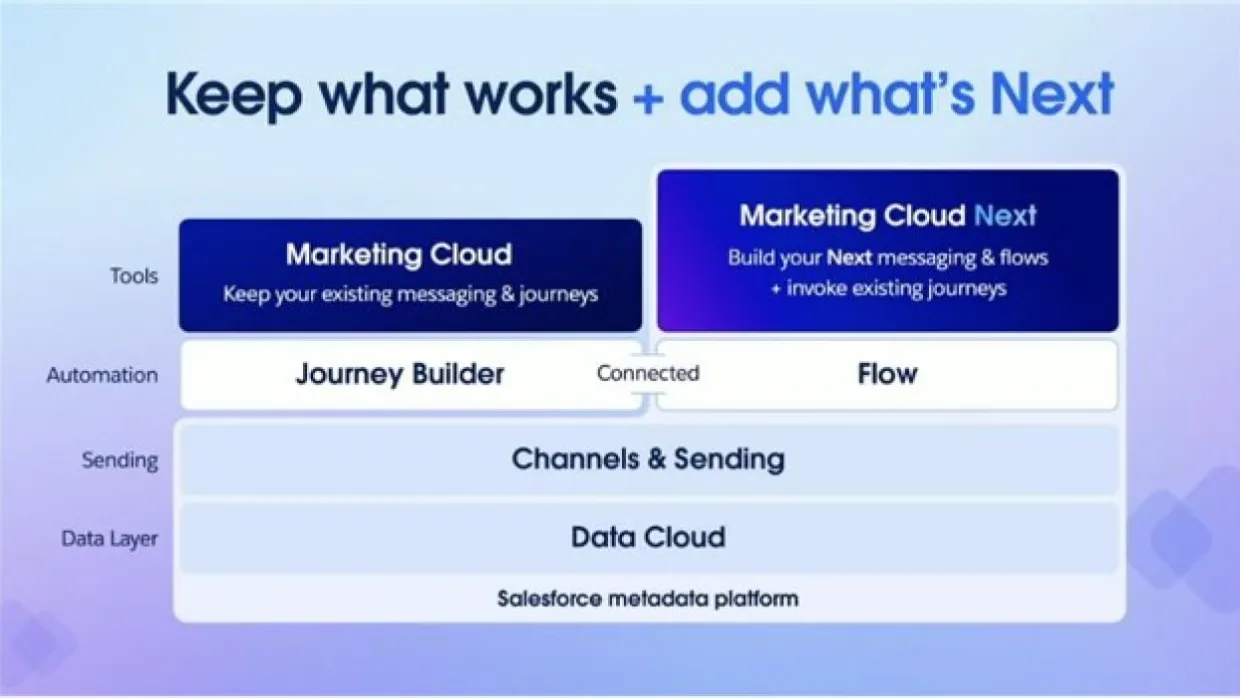Marketing Automation
Marketing Cloud Next for Engagement: Unlocking the Next Generation of Customer Journeys

Salesforce’s Winter ’26 release shines a spotlight on Marketing Cloud Next for Engagement, a major step forward that brings next-generation capabilities directly into the hands of existing Marketing Cloud Engagement customers.
The beauty of this evolution is that it’s not a migration, but a convergence. Customers don’t need to start from scratch or re-platform. Instead, they can extend their current investments, whether that’s automation, segments created in Data Cloud, or analytics, while layering on new capabilities powered by Next. In other words: keep what works and add what’s next.

What Marketing Cloud Next for Engagement Offers
With this release, Engagement customers can now access many of the advanced tools previously seen as “future features” of Marketing Cloud Next. These include Salesforce Flow, Campaigns, Digital Wallet, Agent Builder, and unified analytics, all within the Engagement environment you already know.
- Journeys: Smarter, AI-Driven Experiences
Marketers can now take advantage of Agentforce within journeys. Using Agent Builder, you can configure a Journey Decisioning Agent that evaluates customer context, suggests the most relevant journeys, and even generates tailored message content. These personalized recommendations are stored in data extensions, ready to be orchestrated in Journey Builder.
- Flow Builder: Orchestration Across Salesforce and Beyond
Flow Builder is now available natively to Engagement customers, unifying automation across Salesforce clouds. This means you can orchestrate end-to-end processes that span marketing, sales, service, commerce, and even external systems, all within a single flow.
- Reporting: A Unified Source of Truth
One of the biggest wins of Marketing Cloud Next for Engagement is consolidated reporting. Instead of piecing together metrics from siloed dashboards, marketers can now build unified reports that pull from Engagement, Sales Cloud, Service Cloud, Loyalty Management, Data Cloud, and Tableau Next.
-
Digital Wallet
Easily track and monitor messaging credit spend for Email, SMS, and WhatsApp in a self-serve dashboard.
What to Check Before Procuring Marketing Cloud Next for Engagement
Before investing in the Next for Engagement SKU, customers should review their current platform configuration to ensure they’re ready to unlock its full value:
-
Data Readiness
Before moving to Marketing Cloud Next for Engagement, make sure your customer data is in good shape. This means your contact lists should be clean (no duplicates), organized, and up to date. All of this information should also flow into Data Cloud, since many of the new features in Next (like real-time journeys and smarter segmentation) depend on accurate and live data. Think of it like building a house—you want solid bricks before you add a modern roof.
-
Governance & Permissions
With Marketing Cloud Next, different Salesforce systems (Engagement, Sales, Service, Data Cloud) talk to each other more closely than before. That means your teams need clear roles and the right level of access in both Marketing Cloud Engagement and Marketing Cloud Next. Without the right governance, there’s a risk of people stepping on each other’s toes, for example, marketing changing a process that service depends on. Clear permissions and team alignment ensure smoother cross-cloud workflows.
-
Identity Strategy
Before enabling Marketing Cloud Next, it’s important to be clear about the business outcomes you want to achieve with the Marketing Cloud Next for Engagement SKU—for example, real-time customer journeys, unified reporting, or AI-driven personalization. Once those outcomes are defined, take a step back and review your current setup in both Marketing Cloud Engagement and CRM.
Why This Matters
Marketing Cloud Next for Engagement is more than a feature release, it’s a bridge to the future of agentic, AI-powered marketing. By blending proven Marketing Cloud Engagement capabilities with the innovations of Next, businesses can design smarter, real-time, and deeply connected customer journeys without the disruption of a platform overhaul.
For marketers, this means less time stitching tools together and more time delivering experiences that feel seamless to customers.